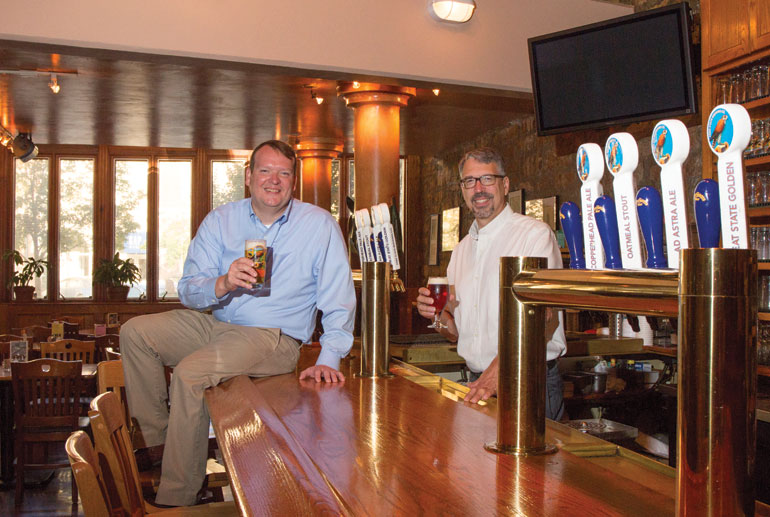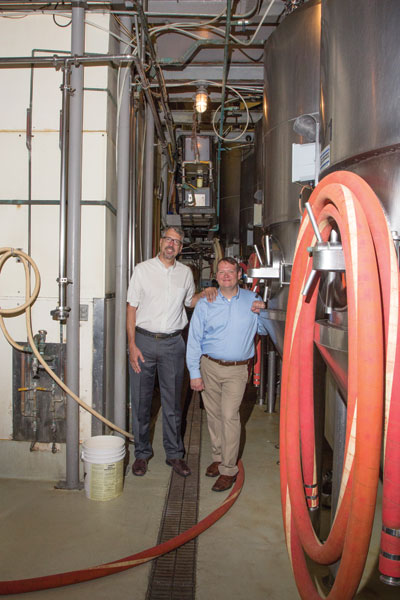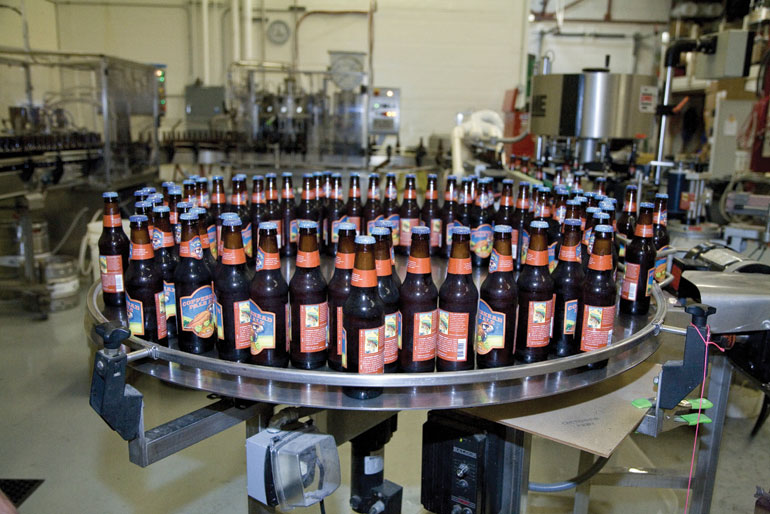| 2014 Q3 | story by ANNE BROCKHOFF | photos by STEVEN HERTZOG |

Alex Hamilton and Steve Bradt at the Free State Brewing Co. restaurant.
Surviving 25 years in the restaurant business is hard enough. Making it to the quarter century mark with a loyal following and sustained creative culinary and brewing energy is nothing short of remarkable. But that’s exactly what Free State Brewing Company has done.
The key? People.
“With a multi-faceted business like ours, having dedicated, experienced staff is crucial to continued innovation and development,” said Chuck Magerl, who opened Free State at 636 Massachusetts Street in 1989. A dozen veterans have played significant roles, including Steve Bradt, head of brewing and bottling, and general manager Alex Hamilton, Magerl says.
Bradt and Hamilton have worked at Free State since it’s opening, and both have helped shape its identity. There have certainly been plenty of changes over that time, among them downtown’s revitalization and the craft brewing industry’s boom, bust and now resurgence.
Free State has become a Lawrence mainstay, with 112 full- and part-time employees between its original location and the bottling facility at 19th St. and Moodie Road. Guests flock to the brewpub on sunny afternoons and game days, a sight that once would have been hard to envision.
A few decades ago, the north end of Massachusetts Street was anything but a destination, with sparse lighting, limited parallel parking and towering, defunct grain elevators.
“I grew up in Lawrence, and nobody came downtown back then,” Bradt said.
Then, in the 1980s, the old elevators were demolished, and Lawrence dedicated its current city hall building at Sixth and Massachusetts streets. The Eldridge Hotel and Liberty Hall were both restored, paving the way for further retail and commercial development.
“The renovation of those two historical buildings was just the beginning,” Bradt said, who did construction on Liberty Hall while still a student at the University of Kansas.
Free State’s location was one of five Magerl looked at, he says. It was in the worst condition, but Liberty Hall’s owners, Charley Oldfather and Dave Millstein, caught wind of the project. They became involved, purchased the property and helped lead Free State’s design and construction, Magerl says. Adding the brewpub to block’s mix certainly helped bolster the area, though Magerl is humble when asked about its impact.
“Many people have made efforts to keep downtown vibrant and attractive for a wide range of commercial activity,” Magerl said. “I’m proud we’ve been part of that effort.”

Bradt & Hamilton at the Free State Brewery.
Free State also resurrected a bit of Kansas history by opening the state’s first legal brewery in more than a century. While the state once had some 90 breweries, that ended in 1881 when Kansas enacted its own form of prohibition, according to Kansas Breweries and Beer: 1854 to 1911 (Ad Astra Press, 1992).
Thirty-nine years later, the U.S. passed the 18th Amendment, putting everyone else out of business, too. Even after national Prohibition’s repeal in 1933, brewing was slow to recover. National brands and lighter beers dominated the market, so consumers thirsty for other flavors turned to home brewing.
By the 1980s, home brew fervor blossomed into a nascent microbrewing and brewpub industry. Growth continued into the 1990s, then flattened, in large part because consumers learned craft didn’t always equal quality, according to Bradt.
“People were wary,” Bradt said. “Craft beer wasn’t necessarily good, it wasn’t necessarily consistent, but it was always more expensive.”
That’s changed recently as consumers enamored with European-style beers flocked to smaller breweries. The number of U.S. craft breweries has surged from 537 in 1994 to more than 2,800 in 2013, with more than 1,500 in development, according to the Brewers Association, a trade group.
“At the time we opened, there wasn’t anything similar to us between Chicago and Denver,” Bradt said. “Now, there is literally a new brewery opening every day.”
Kansas’ 20 craft breweries together generated more than $257.9 million for the Kansas economy in 2012, according to the Brewers Association. When Free State opened, though, it was the only game in the state. Bradt started behind the bar, but was quickly drawn to brewing.
“The blend of art and science in brewing is fascinating to me,” Bradt said, who has a degree in history from KU and comes from a family of artists, musicians and mathematicians.
He peppered Magerl, Free State’s first brewer, with questions. After a few months, Magerl offered him a brewing job, and Bradt jumped at the challenge.
“I’m a process geek. I love seeing how things work,” Bradt said.
Bradt read everything he could find about brewing, attended a brewing school in Chicago and continued developing his skills. He’s now on the Brewers Association Board, President of the Kansas Craft Brewers Guild and has served as a judge at the Great American Beer Festival and the World Beer Cup.
At Free State, he oversees production of the brewery’s four flagship beers, Ad Astra Ale, Wheat State Golden, Oatmeal Stout and Copperhead Pale Ale, and the eight to 13 seasonal brews produced at any one time.
For years, customers could only get those beers at the restaurant. Then the company opened its 12,000-square foot bottling facility in 2010, following a shift in Kansas law that allowed breweries to hold more than one liquor license.
Free State distributes bottled beer throughout Kansas and Missouri. It recently expanded into Nebraska and will add Iowa by the end of 2014, Magerl says.
While some restaurant customers still ask for Free State’s lightest or most “American” beer, many are as deep into beer geekdom as Bradt. They want to know what kind of hops were used. Simco? Chinook? Citra? The variety of malt and what the IBU, International Bitterness Unit, level is.
Consumers are equally adventurous when it comes to food. The menu still offers burgers, sandwiches and other Free State standards. However, in early August, the specials also included dishes such as achiote chicken penne, Korean bulgogi, lemon thyme schnitzel and chorizo nachos.
Orders these days are as likely to be served with fresh or steamed vegetables, rice or fruit as they are French fries, because that’s what customers want. And as for the local food movement, Free State has long purchased produce, beef and chicken from area farms because, according to Hamilton, it made sense.
There’s no chasing trends or concepts at Free State, Hamilton says. Simply good food and beer made the way customers want it.
“We’re a populist establishment,” Hamilton said, who grew up in Lawrence and then spent several years working at the Halekulani Hotel in Honolulu. He returned to Lawrence, got a job waiting tables at Free State in 1989. He then became part-time supervisor and then manager responsibilities soon followed.
“We have pub grub, but we also have a beet Nicoise salad that’s awesome,” Hamilton said, who holds an associate’s degree in hospitality management from Johnson County Community College. “Our menu reflects our ideals in business.”

Free State Brewery bottling in progress. Bradt oversees production of the brewery’s four flagship beers, such as Ad Astra Ale, Wheat State Golden, Oatmeal Stout and Copperhead Pale Ale.
And perhaps the most important ideal is one of community. Part of that is a corporate commitment, which Free State supports organizations such as the Boys & Girls Club of Lawrence and Bert Nash Community Mental Health Center. Bradt serves on the Health Care Access Board of Directors. In July, Free State hosted an open house for the clinic, which provides services to uninsured Douglas County residents.
There’s also the very real personal sense of personal community at the restaurant, Hamilton says. Free State’s customers include university professors, business owners, community leaders, construction workers and college students. There are regulars who drive in from Tonganoxie, Topeka and Kansas City, as well as out-of-town visitors. People come when they’re happy and when they’re not, says Hamilton.
“Free State hosts people who’ve had bad and good things happen in their lives,” Hamilton said, who volunteers with the Girl Scouts, his two daughters’ school and his family’s church. “Regular customers, friends and family members, people who get sick or lose a loved one—they all come here and feel the support.”
Bradt agrees.
“We’re often the first stop on the way home after they have their first kid,” Bradt said, noting that Free State also sees those kids grow up, hosts their graduation parties and serves them their first beer when they turn 21.
Training and supporting staff is essential, both men say. Free State has long offered benefits like health insurance, matching retirement accounts and paid vacation. It also invests in training. All servers are expected to understand both food and beer, and service staff must pass six examinations before taking to the floor solo.
Once there, there’s no set script. Hamilton encourages servers to develop a rapport with customers according to their own style, and their success depends on an innate desire to create a positive experience for each guest.
“You can’t teach hospitality,” Hamilton said. “You’ve either got it or you don’t.”
When giving new employees a tour of the building, Hamilton likens their jobs to being onstage, something Bradt agreed wholeheartedly with.
“People come here not just for the food and drink, the physical things, but for the entertainment,” Bradt said. “Making it a good time for them is part of the performance. If you feel that, then it’s genuine.” ■

5 Comments
Pingback: Baccarat Guidelines Guide For Indian Players - Shikha Dabas
Pingback: The Untold Story on Evolution Gaming That You Must Read or Be Omitted - Kenki Thailand
884495 575138I like this weblog its a master peace ! Glad I detected this on google . 723612
excellent post, very informative. I’m wondering why
the other experts of this sector don’t understand this. You must continue your writing.
I’m confident, you have a great readers’ base already!
Highly energetic article, I liked that a lot. Will there be a
part 2?